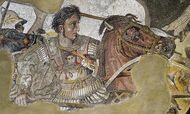356 ق.م.
| 356 ق.م. حسب الموضوع | |
| السياسة | |
| زعماء الدول – الدول ذات السيادة | |
| تصنيفات المواليد والوفيات | |
| المواليد – الوفيات | |
| تصنيفات التأسيسات والانحلالات | |
| التأسيسات – الانحلالات | |
السنة 356 ق.م. . (الرابط يعرض روزنامة كاملة) من التقويم اليوليوسي. وكان يسبقها سنة 357 ق.م. وتلتها سنة 355 ق.م..
الأحداث
حسب المكان
الإمبراطورية الفارسية
- Having blamed their defeats to Philip II in Thessaly and Chalcidice on his colleagues (Iphicrates and Timotheus), Chares is left in sole command of the Athenian fleet. Chares, in need of money for his war effort, frowns upon asking it from Athens, so, partly compelled by his mercenaries, he enters the service of the insurgent Achaemenid satrap of Phrygia Artabazus who rewards Chares very generously.[1]
- Artabazus is also supported by the Thebans، who send him 5,000 men under one of their generals Pammenes. With the assistance of these and other allies, Artabazus defeats his Achaemenid enemies in two great battles.[بحاجة لمصدر]
- The Achaemenid King Artaxerxes III orders all the satraps (governors) of his empire to dismiss their mercenaries. The Athenians, who have originally approved their mercenaries' collaboration with Artabazus of Phrygia, order them to leave due to their fear of Achaemenid support for the rebellion of Chios، Rhodes، and Cos. Thebes follows suit and withdraws its mercenaries.
- With King Artaxerxes III succeeding in depriving Artabazus of his Athenian and Theban allies, Artabazus is defeated by the Persian King's general, Autophradates.[بحاجة لمصدر]
اليونان
- Philip II of Macedon secretly offers the city of Amphipolis back to the Athenians in exchange for the valuable port of Pydna. Despite the Athenians being willing to comply, both Pydna and Potidaea are conquered by the Macedonians (along with other Athenian strongholds in Thessaly and Chalcidice) despite being defended by Athenian forces led by general and mercenary commander, Chares، as well as generals Iphicrates and Timotheus.[بحاجة لمصدر]
- With Pydna and Potidaea occupied, Philip II decides to keep Amphipolis anyway. He also takes the city of Crenides from the Odrysae and renames it Philippi.[بحاجة لمصدر]
- The Phocians capture and sack Delphi in whose territory the famous temple and oracle stand. A sacred war is declared against them by the other members of the Great Amphictyonic League. The Phocians, led by two capable generals, Philomelus and Onomarchus, use Delphi's riches to hire a mercenary army to carry the war into Boeotia and Thessaly.[بحاجة لمصدر]
- The Social War begins between the Second Athenian League، led by Athens، and its revolting allies of Chios، Rhodes، and Kos as well as the independent state Byzantium. Mausolus، the tyrant of Caria، instigates the rebellion against the Athenian control of these states. The revolting allies ravage the islands of Lemnos and Imbros which are loyal to Athens.[1]
- The Athenian generals Chares and Chabrias are given command of the Athenian fleet with the aim of defeating the rebellious cities. However, Chabrias' fleet is defeated and he is killed in its attack on the island of Chios, off the coast of Ionia.[بحاجة لمصدر]
- Chares is given sole command of the Athenian fleet and withdraws to the Hellespont to move against Byzantium. The generals Timotheus، Iphicrates and his son Menestheus are sent with 60 ships to help him when the enemy fleet is sighted on the Hellespont. Timotheus and Iphicrates refuse to engage due to a severe gale, but Chares does engage and lose many of his ships. Timotheus and Iphicrates are accused by Chares and put on trial, however only Timotheus is condemned to pay a fine.[1]
الجمهورية الرومانية
- Gaius Marcius Rutilus is the first plebeian to be chosen as a dictator in Rome.[2]
الصين
- With his reforms initiated in this year, the Chinese prime minister Shang Yang starts to transform the once marginal and frontier State of Qin to become the most dominant military force amongst the Warring States of China by the 3rd century BC.[بحاجة لمصدر]
حسب الموضوع
العمارة
- 21 يوليو (التاريخ التقليدي) - معبد أرتميس في إفسوس is burned down by a madman named Herostratus, destroying one of the Seven Wonders of the World. The great temple was built by Croesus، king of Lydia، in about 550 BC and was famous not only for its great size (110 metres by 55 metres), but also for the magnificent works of art that adorned it.[بحاجة لمصدر]
المواليد

الملك الإسكندر الأكبر
- 20/21 يوليو - الإسكندر الأكبر، ملك مقدونيا (ت. 323 BC).[3]
- Hephaestion، Macedonian general, soldier, aristocrat, and companion of Alexander the Great (d. 324 BC).[4]
الوفيات
- خابرياس، جنرال أثيني توفي في خيوس[5]
- هيروستراتوس.[بحاجة لمصدر]
- Philistus.[بحاجة لمصدر]
المراجع
- ^ أ ب ت Siculus, Diodorus. "21". Library. Vol. XVI.
- ^ Matz, David (2000). Famous Firsts in the Ancient Greek and Roman World. Jefferson: McFarland. p. 42. ISBN 978-0-78640-599-2.
- ^ Ogden, Daniel, ed. (2024). The Cambridge Companion to Alexander the Great. Cambridge: Cambridge University Press. p. 29. ISBN 978-1-10884-099-6.
- ^ Wasson, Donald L. "Hephaestion". World History Encyclopedia. Retrieved February 25, 2024.
- ^ "Chabrias". Encyclopædia Britannica. February 21, 2024. Retrieved February 25, 2024.